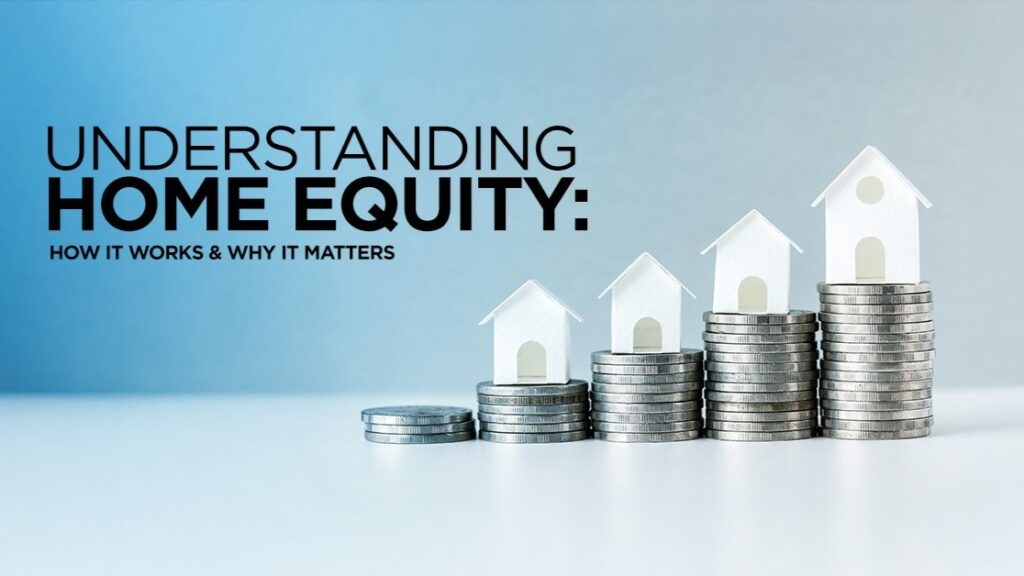Introduction
Home Equity Real estate has long been one of the most reliable ways to build wealth. One of the key concepts behind real estate wealth creation is home equity. Home equity not only represents ownership in a valuable asset but also offers a financial tool that can be leveraged for investments, debt consolidation, or major expenses. In this guide, we’ll dive deep into understanding home equity, how to build it, how to use it strategically, and why it’s critical for long-term financial growth.
Understanding Home Equity

What Is Home Equity?
Home equity is the difference between the market value of your home and the amount you still owe on your mortgage. It reflects how much of your home you truly “own” versus how much is still financed by the bank.
Formula:
Home Equity = Current Home Value – Outstanding Mortgage Balance
Why Home Equity Matters
- Represents real ownership and wealth
- Can be used as collateral for loans
- Contributes to net worth
- Can be a financial safety net during emergencies
How Home Equity Grows Over Time
Mortgage Payments
Every payment you make toward your mortgage principal increases your equity.
Property Appreciation
As real estate values rise, the value of your home increases, boosting your equity even if your mortgage balance stays the same.
Home Improvements
Strategic renovations like kitchen upgrades or bathroom remodels can significantly increase property value, adding to your home equity.
Building Home Equity Faster

Make Extra Mortgage Payments
Applying extra money toward your principal loan balance reduces the outstanding debt quicker and accelerates equity growth.
Choose a Shorter Loan Term
15-year mortgages typically build equity faster than 30-year loans due to higher principal payments.
Reinvest in Home Upgrades
Focus on high-return projects like energy-efficient windows, landscaping, and minor kitchen or bathroom remodels.
Avoid Market Depreciation
Invest in maintenance and upkeep to preserve or even increase your home’s value during market fluctuations.
Ways to Tap Into Home Equity
Home Equity Loan
A lump-sum loan that uses your home as collateral. You receive a fixed amount upfront and repay it with fixed interest rates over time.
Home Equity Line of Credit (HELOC)
A revolving credit line, similar to a credit card, secured by your home. You borrow only what you need, and interest is charged only on the amount used.
Cash-Out Refinance
You refinance your existing mortgage for more than you owe and take the difference in cash. This option resets your mortgage terms but can offer large sums of accessible cash.
Reverse Mortgage (for Seniors)
Homeowners aged 62+ can convert home equity into tax-free income without selling their home, although it comes with conditions.
Pros and Cons of Using Home Equity
Pros
- Lower interest rates compared to unsecured loans
- Potential tax benefits on interest payments (consult tax advisor)
- Can fund large expenses like education, home improvements, or investments
- Allows for debt consolidation with better loan terms
Cons
- Risk of foreclosure if you default
- Reduces the amount of equity available for future needs
- Closing costs and fees may apply
- Market downturns could reduce your home’s value, impacting equity
Smart Uses of Home Equity
Home Renovations
Upgrading your home can increase its market value, thus multiplying the value of your original equity investment.
Education Costs
Borrowing against home equity can sometimes offer lower rates than student loans for funding education expenses.
Business Investments
Many entrepreneurs use home equity to finance startups or expand existing businesses.
Emergency Fund
Tapping into home equity through a HELOC can provide a financial safety net for emergencies or unexpected major expenses.
When Not to Use Home Equity
Luxuries and Non-Essential Expenses
Using home equity for vacations, expensive cars, or luxury goods is risky and can jeopardize your financial future.
Unstable Financial Situations
If your job or income is uncertain, it’s better not to leverage your home and risk foreclosure.
Short-Term Residency Plans
If you plan to sell soon, tapping into home equity may not make sense due to closing costs and insufficient time to recoup expenses.
How Real Estate Builds Wealth Through Equity

Forced Savings
Mortgage payments act as a structured savings plan, consistently building equity and growing your wealth.
Appreciation Gains
As your home’s value increases, you gain “unrealized” wealth without actively doing anything.
Leverage Opportunities
Homeowners can borrow against their growing equity to invest in additional real estate or other ventures, creating multiple streams of income.
Retirement Security
Selling a highly appreciated property later can provide significant cash flow during retirement.
How to Protect and Grow Home Equity
Regular Home Maintenance
Prevent small issues from becoming big problems that can decrease your home’s value.
Smart Insurance Choices
Proper homeowners insurance protects your investment against disasters and accidents.
Monitor the Market
Understand the local real estate market trends to time upgrades, refinancing, or selling appropriately.
Avoid Over-Borrowing
Only borrow against your home equity when absolutely necessary, and always have a solid repayment plan.
Also Read : The Role Of Risk Assessment In Project Management
Conclusion
Home equity is one of the most powerful yet underrated tools for building personal wealth. It transforms your living space into a financial asset that can support you through life’s milestones — whether that’s funding education, expanding a business, or securing your retirement. Building home equity requires discipline, smart financial planning, and a long-term perspective. By treating your home not just as a shelter but as a strategic investment, you can unlock substantial wealth and financial security over time.
FAQs
What is home equity?
Home equity is the portion of your home that you truly own, calculated by subtracting your mortgage balance from your home’s market value.
How can I build home equity faster?
Making extra mortgage payments, choosing a shorter loan term, and improving your property can help you build equity more quickly.
What is a HELOC?
A Home Equity Line of Credit (HELOC) is a revolving line of credit secured by your home’s equity, allowing you to borrow money as needed.
Can home equity decrease?
Yes, if your property’s market value drops or if you refinance and increase your mortgage balance.
Is tapping into home equity a good idea?
It can be if used wisely for investments, necessary expenses, or debt consolidation, but it comes with risks if not managed properly.
How much home equity do I need to qualify for a loan?
Typically, lenders require at least 15% to 20% equity in your home to qualify for a home equity loan or HELOC.
What are the risks of using home equity?
The main risk is losing your home to foreclosure if you default on the repayment.
Does home equity impact net worth?
Yes, growing home equity directly increases your net worth by reducing your liabilities and boosting asset value.
Should I use home equity to buy another property?
It can be a strategic move for investing, but only if the new property generates income or appreciates over time.
How often should I check my home equity?
It’s good practice to review your home equity annually or whenever major real estate market shifts occur.




